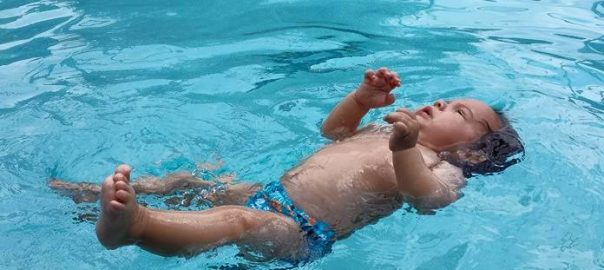In Texas, drowning is the #1 cause of accidental death in children ages 0-4.
Young children have surprising strength, agility and natural curiosity.
They are experts at climbing, escaping and exploring…it only takes a second
and they can defeat your best efforts to protect them. If your child is mobile
and can crawl or walk to a pool or body of water, his or her independent swimming and floating skills could save their life.
In recent years, infant swimming lessons have been the subject of a great deal of controversy. There are still a number of very legitimate concerns about infant swimming programs. The issues and concerns involve hyponatremia, retention of skills, a false sense of security parents may gain when their child has had swimming lessons and the need for lessons in the first place.
Hyponatremia has been repeatedly reported in the press as a major hazard of infant swimming lessons. Hyponatremia (or water intoxication) occurs when an infant either drinks too much water or is not excreting enough fluids properly or a combination of the two. Only three cases of water intoxication from other “infant swimming programs” have been reported in the professional medical literature nationwide. Our instructors require that the parents monitor their baby’s urine and bowel output as well as record the sleep and diet of their baby while he is enrolled in lessons. The instructor has been trained to analyze this data via verbal poolside interview with the parent or caregiver daily. This is done to alert the instructor of the possibility of land-based complications that could predispose the child to hyponatremia during an otherwise normal lesson situation. In addition, factors such as injury, illness, teething and medications are all critically related to the child’s performance in the water and must be considered if the child is to receive the safest possible lesson. The instructor also maintains certification in CPR and infant/child first aid.
The retention of the skills taught to the baby will obviously depend upon the quality and manner of the instruction. Swimming must be taught to the baby as a sensory-motor skill. The skills cannot be combined with games and songs; if swimming is presented as an intellectual skill, then, yes, he or she will probably forget the games, the songs and how to swim. Our retention figures range between 94 and 100 percent after one year of no lessons.
It is valid and sensible that many physicians and their organizations have spoken out against infant swimming programs. However, some pediatricians are now calling infant drowning an epidemic. Some have researched this program and recommend it to their patients. There are now pediatricians who have become swimming instructors because the drowning epidemic has become so prominent. There is no controversy that infants should be taught to swim because it is a matter of survival. The controversy is how these survival swimming experiences should be conducted and how the consumer can be educated and protected.
swimsprout™ has developed a complete program of parent education concerning many facets of drowning prevention. The topics covered with parents of students are: attitude and emotions, physiology and safety before, during and after the lesson, factors in learning, behaviorism, family aquatic safety, CPR and first aid.
